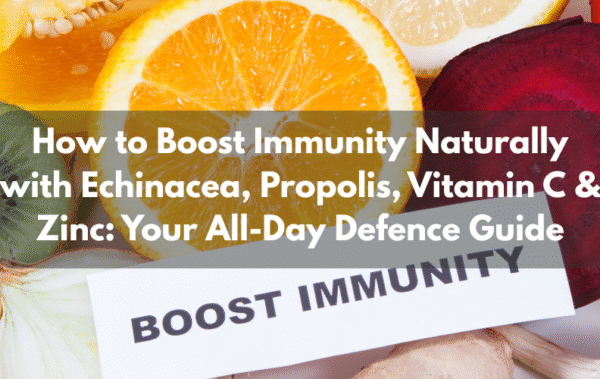No products in the cart.
Biotin: What It Is, Benefits, and Dosage – A Comprehensive Guide

Introduction: The Power of Biotin in Health and Wellness
Biotin, also known as Vitamin B7, is a water-soluble B-complex vitamin that plays a crucial role in energy metabolism, cell growth, and maintaining healthy hair, skin, and nails. Often marketed as a beauty supplement, biotin is much more than just a hair and nail enhancer—it is essential for neurological function, digestion, and overall well-being.
Despite its popularity, many people are unaware of how biotin works, its benefits, recommended dosage, and potential risks. In this detailed guide, we will explore everything you need to know about biotin, including its sources, health benefits, deficiency symptoms, and how to incorporate it into your daily routine.
1. What Is Biotin?
Understanding Biotin’s Role in the Body
Biotin is a coenzyme that helps the body convert carbohydrates, fats, and proteins into energy. It plays a vital role in various metabolic processes, ensuring that nutrients are properly utilized for growth, repair, and maintenance.
Biotin’s Connection to the B-Vitamin Family
Biotin is part of the B-vitamin complex, a group of vitamins responsible for supporting brain function, energy production, and cellular health. Unlike fat-soluble vitamins, biotin is water-soluble, meaning the body does not store excess amounts—it must be consumed regularly through diet or supplements.
Where Does Biotin Come From?
Biotin is naturally found in many foods, and the body also produces small amounts through gut bacteria. However, dietary intake remains the primary source of biotin for most individuals.
2. Health Benefits of Biotin
Biotin is essential for multiple bodily functions, and its benefits extend far beyond hair and nail health. Let’s explore the scientific-backed advantages of biotin supplementation.
1. Supports Healthy Hair Growth
Biotin is widely recognized for its role in hair health. It helps strengthen hair follicles, reduces breakage, and promotes thicker, shinier hair. Studies suggest that biotin deficiency can lead to hair thinning and loss, making supplementation beneficial for those experiencing hair-related issues.
2. Strengthens Nails and Prevents Brittleness
Biotin improves keratin infrastructure, the protein responsible for strong nails. Research indicates that biotin supplementation can reduce nail brittleness and improve overall nail strength, preventing breakage and splitting.
3. Enhances Skin Health
Biotin plays a role in skin hydration and repair. It helps maintain moisture balance, reducing dryness and irritation. Some studies suggest that biotin deficiency may contribute to skin conditions like dermatitis and acne.
4. Supports Brain Function and Cognitive Health
Biotin is essential for neurological function. It aids in neurotransmitter activity, improving memory, focus, and mental clarity. Some research suggests that biotin may help reduce symptoms of depression and anxiety by supporting brain health.
5. Aids in Energy Production and Metabolism
Biotin helps convert food into usable energy, ensuring that the body efficiently metabolizes carbohydrates, fats, and proteins. This makes it an important nutrient for maintaining energy levels and preventing fatigue.
6. Promotes Heart Health
Biotin supports cardiovascular function by helping regulate cholesterol levels. Some studies indicate that biotin may help reduce LDL (bad cholesterol) and increase HDL (good cholesterol), lowering the risk of heart disease.
7. Supports Pregnancy and Fetal Development
Biotin is essential during pregnancy, as it plays a role in fetal growth and development. Pregnant women often experience mild biotin deficiency, making supplementation beneficial for ensuring proper nutrient intake.
8. Helps Manage Blood Sugar Levels
Biotin may assist in blood sugar regulation, particularly in individuals with diabetes. Some research suggests that biotin supplementation can help improve insulin sensitivity and lower blood glucose levels.
3. Signs and Symptoms of Biotin Deficiency
Although biotin deficiency is rare, certain individuals may experience low biotin levels due to dietary restrictions, medical conditions, or lifestyle factors.
Common Symptoms of Biotin Deficiency
- Hair thinning or hair loss
- Brittle nails prone to breakage
- Dry, irritated skin or dermatitis
- Fatigue and low energy levels
- Neurological symptoms (depression, brain fog, memory issues)
- Muscle weakness and cramps
Who Is at Risk for Biotin Deficiency?
- Pregnant women (higher biotin requirements)
- Individuals with digestive disorders (Crohn’s disease, celiac disease)
- People consuming excessive alcohol (impairs biotin absorption)
- Individuals taking long-term antibiotics (disrupts gut bacteria that produce biotin)
- Those following a strict vegan diet (biotin-rich foods are mostly animal-based)
4. Best Food Sources of Biotin
Biotin is naturally present in many foods, making it easy to incorporate into a balanced diet.
Top Biotin-Rich Foods
- Eggs (especially yolks)
- Salmon and tuna
- Nuts and seeds (almonds, walnuts, sunflower seeds)
- Sweet potatoes
- Spinach and broccoli
- Avocados
- Whole grains
- Mushrooms
Eating a varied diet rich in these foods can help maintain optimal biotin levels without the need for supplements.
5. Recommended Biotin Dosage
Daily Biotin Intake Guidelines
The recommended daily intake of biotin varies based on age, gender, and health status.
| Age Group | Recommended Daily Intake (mcg) |
|---|---|
| Infants (0-6 months) | 5 mcg |
| Infants (7-12 months) | 6 mcg |
| Children (1-3 years) | 8 mcg |
| Children (4-8 years) | 12 mcg |
| Adolescents (9-13 years) | 20 mcg |
| Teens (14-18 years) | 25 mcg |
| Adults (19+ years) | 30 mcg |
| Pregnant Women | 30 mcg |
| Breastfeeding Women | 35 mcg |
Can You Take Too Much Biotin?
Biotin is water-soluble, meaning excess amounts are excreted through urine. However, high doses (above 5,000 mcg daily) may interfere with lab tests, leading to inaccurate results for thyroid function and heart health markers.
6. Should You Take Biotin Supplements?
Who May Benefit from Biotin Supplements?
- Individuals with biotin deficiency
- Those experiencing hair thinning or brittle nails
- Pregnant women needing higher biotin intake
- People with digestive disorders affecting nutrient absorption
Choosing the Right Biotin Supplement
Biotin supplements come in various forms:
- Capsules and tablets
- Gummies
- Liquid biotin drops
Look for high-quality, third-party tested supplements to ensure purity and effectiveness.
Conclusion: Is Biotin Right for You?
Biotin is a powerful vitamin that supports hair, skin, nails, metabolism, brain function, and overall health. While deficiency is rare, ensuring adequate intake through diet or supplements can help maintain optimal well-being.
Key Takeaways:
✅ Biotin is essential for energy metabolism, hair growth, and skin health.
✅ Deficiency symptoms include hair loss, brittle nails, fatigue, and neurological issues.
✅ Biotin-rich foods include eggs, nuts, fish, and leafy greens.
✅ The recommended daily intake is 30 mcg for adults.
✅ High doses may interfere with lab tests, so moderation is key.
If you’re considering biotin supplementation, consult a healthcare provider to determine the best dosage for your needs.
Start your wellness journey today — Visit Unike Nutra Now
Follow us
Facebook – https://www.facebook.com/profile.php?id=61567462823245
Instagram – https://www.instagram.com/unikenutra/
Twitter – https://x.com/Unikenutra
LinkedIn: https://www.linkedin.com/company/unike-nutra/
Amazon: https://www.amazon.com/stores/UnikeNutra/
Buy Now:






